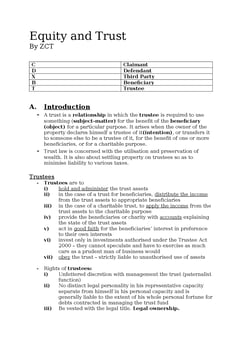Milroy v Lord [1862] 4 De GF & J 264, 45 ER 1185
Judgement for the case Milroy v Lord
Table Of Contents
KEY POINTS
-
A voluntary deed is a legal document executed willingly by an individual, typically to convey property, assets, or rights to another party.
This type of agreement is characterized by the absence of coercion or external pressure, indicating the voluntary nature of the transaction.
Voluntary deeds are often used in various legal contexts, including property transfers, gifts, and assignments, serving as a formal expression of the grantor's intentions.
-
Transferable shares refer to ownership units in a company or financial institution that can be assigned or conveyed from one party to another.
The transfer of shares is typically governed by the rules and procedures established by the relevant institution.
This process often involves recording the transfer in the institution's official books or registers to formalize the change in ownership.
The ability to transfer shares provides liquidity to shareholders and allows for changes in ownership without affecting the entity's overall structure.
-
Remitted dividends pertain to the distribution of profits or earnings by a company to its shareholders.
Dividends are a financial return on the investment made by shareholders in the company. When dividends are remitted, they are sent or transferred to the shareholders, providing them with a tangible benefit from their ownership.
This process is a crucial aspect of corporate finance, aligning the interests of shareholders with the financial success of the company and contributing to the overall return on investment for investors.
FACTS
-
In this case, T. M. executed a voluntary deed, purportedly assigning fifty shares in the L. Bank to S. L.
These shares were intended to be held by S. L. under specific trusts for the benefit of the Plaintiffs.
However, despite the intent expressed in the deed, no actual transfer of the shares occurred through the entry in the bank's books.
At the time of the execution, S. L. held a general power of attorney that granted him the authority to transfer T. M.'s shares. Additionally, after the settlement, T. M. granted S. L. a further power of attorney, enabling him to receive dividends on the shares in the bank.
-
Over the three years following the execution of the deed, T. M. lived, and during this period, S. L. received the dividends on the shares.
These dividends were then remitted by S. L. to the Plaintiffs, sometimes directly and at other times through T. M., highlighting the complex dynamics surrounding the ownership and financial benefits of the shares.
JUDGEMENT
-
The court held that, given the settlor's intention was not to establish himself as a trustee for the shares but to vest the trust in S. L., there was no valid creation of a trust of the shares by the settlor.
Furthermore, it was determined that no valid trust of the shares was established in S. L.
While he possessed a power of attorney that could have allowed him to vest the shares in himself, he refrained from doing so and was not obligated to act without specific directions from the settlor.
This was due to the fact that S. L. held the power of attorney solely as an agent for the settlor.
As a result, the court, in reversing the appealed decree, concluded that the disposition of the shares failed as it amounted to an imperfect voluntary gift.
COMMENTARY
The case provides a concise overview of legal concepts, emphasizing voluntary deeds, transferable shares, and remitted dividends.
-
It highlights the significance of voluntary deeds as expressions of the grantor's intentions without coercion.
The discussion on transferable shares underscores their role in corporate structures, facilitating liquidity and ownership changes.
Remitted dividends are explained as tangible returns aligning shareholder interests with a company's success.
-
In the specific case of T. M. and S. L., the narrative details a complex situation involving a voluntary deed for shares, power of attorney, and remitted dividends.
The court's judgment emphasizes the settlor's intention, ruling that no valid trust of the shares was created due to the settlor's non-trustee intention and S. L.'s limited authority under the power of attorney.
Consequently, the court overturned the decree, determining the disposition of the shares as an imperfect voluntary gift.
For Further Study on Milroy v Lord
Need instant answers? Our AI exam tutor is here to help.
Ask questions 🙋 Get answers 📔 It's simple 👁️👄👁️
Our AI is educated by the highest scoring students across all subjects and schools. Join hundreds of your peers today.
Get StartedSimilar Cases
Related Product Samples
These product samples contain the same concepts we cover in this case.

